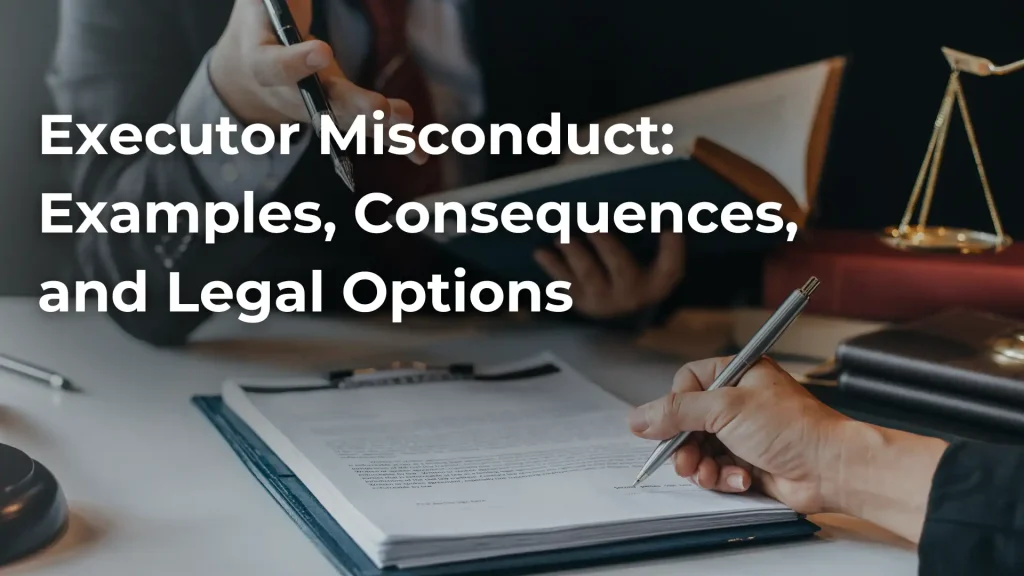
Being named an executor comes with big responsibilities – managing assets, handling debts and taxes, and making sure beneficiaries are taken care of. However, not every executor does their job the way they should, which can lead to disputes or even legal trouble. Let’s break down some examples of executor misconduct, talk about what happens when things go wrong, and go over what you can do to address it if you’re dealing with this issue.
What Is Executor Misconduct?
Executor misconduct happens when someone managing an estate fails to do their job, whether through negligence or outright fraud. Here are some common examples:
- Withholding Inheritances – Delaying or refusing to distribute assets
- Mismanaging Funds – Using estate money for personal gain or poor record-keeping
- Breach of Duty – Acting in self-interest instead of for beneficiaries
- Ignoring Debts/Taxes – Skipping payments or tax filings
- Fraud – Undervaluing assets, stealing proceeds, or falsifying records
Understanding what constitutes executor misconduct is the first step in protecting your rights and ensuring the estate is handled fairly.
Consequences of Executor Misconduct
Executor misconduct can severely impact an estate and expose the executor to heavy legal and financial consequences. Here is what you should know:
- If the executor’s actions cost the estate money, you can take them to court and make them pay it back.
- If the executor acted irresponsibly or unfairly, you can request their removal. The court can appoint someone trustworthy to take over.
- Fraud or bad decisions can destroy the executor’s personal and professional reputation.
- Fraud or theft from the estate is a crime. It can result in fines, jail time, or both.
It is crucial to address executor misconduct quickly to protect the estate and those involved.
Proving Executor Misconduct
If you plan to take legal action, you must prove the executor acted improperly. Here is how you gather the evidence to build your case:
- Pull the bank statements, transaction records, and communication logs. Let the evidence speak for itself.
- Beneficiaries or others involved in the probate process can provide detailed accounts of the executor’s actions.
- You need a sharp attorney to gather evidence, file the motions, and fight for your interests.
With the evidence gathered, you’ll be in a strong position to hold the executor accountable and protect the estate.
Legal Options for Addressing Executor Misconduct
If you think an executor has misbehaved, you must act quickly to protect the estate and its beneficiaries. Here is what you can do:
- Talk to a probate attorney to review your case and understand your rights. Look for a lawyer with experience with executor misconduct cases in Dallas, TX.
- If you have evidence of misconduct, you can file a petition in probate court to remove the executor or seek damages.
- Executors must provide a detailed accounting of the estate’s assets and transactions. If they refuse, the court can order them to do it.
- If the executor has breached their fiduciary duty, you can request their removal. The court can appoint someone who will handle the estate properly.
- Mediation can sometimes be quicker and less expensive to resolve disputes between beneficiaries and executors without going to court.
Knowing your legal options gives you the power to take action and ensure that the estate is handled correctly.
Preventing Executor Misconduct

While it is not always possible to predict executor problems with beneficiaries, there are steps you can take to minimize the risk:
- Choose an executor you trust. Pick someone proven to act in good faith and handle finances responsibly.
- Beneficiaries should ask for regular updates on the estate’s administration to keep things transparent.
- Add oversight measures in estate planning documents. This can include co-executors or independent reviews.
Taking proactive steps can help prevent executor misconduct and protect the estate from unnecessary conflicts.
Why You Need Legal Support
Executor misconduct can throw probate into chaos. If you are dealing with withheld inheritances, mismanaged funds, or outright fraud, do not wait. A strong probate attorney can fight for your rights, recover what has been lost, and set things straight.
Contact an Estate Litigation Attorney Today
Executor misconduct is more than a simple issue. It is a serious breach of trust that can cause financial loss and emotional stress. The first step is understanding your rights, whether you are a beneficiary seeking answers or someone exploring your options. With the right legal guidance, you can address the problem and protect what is most important.
At Staubus, Blankenship, Legere and Walker PLLC, we’re here to stand by you every step of the way. Call (214) 833-0100 or contact us online to schedule a consultation with an experienced Dallas estate litigation attorney for executor misconduct and take the first step forward.






